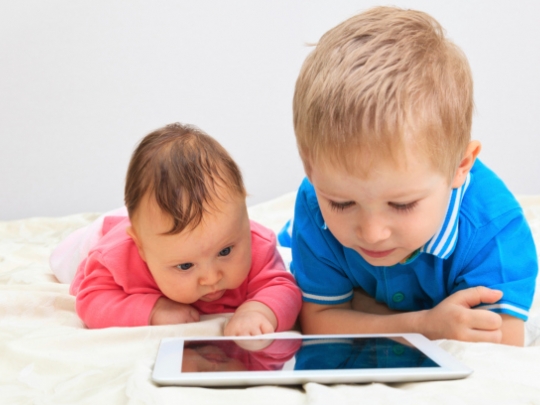Steve Jobs didn’t let his kids use iPads

Smart devices - or should I call them the “modern pacifier”?
We’ve all seen it: a parent using their phone or tablet as a quick fix to distract their baby. Kids swiping and minimising with dexterity when they can’t even speak properly yet. Children, out with family and friends, who can’t look up from their video game. Teens for whom the real world isn’t half as enticing as what’s just a scroll away on their screen.
Last week I read an article in which psychologist Sue Palmer points out the danger of youngsters becoming slaves to their screens. She published a book on it a decade ago, and we all know it was barely a problem then compared to now! On average, kids these days spend five to six hours daily staring at screens, and often this time involves multiple screens (such as playing on a tablet while watching television). And with new devices gaining popularity every few months, it’s hard to determine just how much long-term impact they’re having.
On the whole, smart devices are so handy and valuable to have around. But using them too much does bring about certain dangers, and if kids aren’t taught some moderation when they’re young, they could be seeing a negative impact in their adult lives too.
Here’s what we know: more children are facing obesity or starting school with poor co-ordination, thanks to an increasingly inactive lifestyle. Child development experts are seeing a rise in prescriptions to deal with attention deficit, and aggression levels amongst kids are higher – which seems to be a reaction to the natural pace of life when you’re used to getting immediate updates or entertainment on your screen. Kids are exhibiting poor social skills – where’s the time to look up and learn to interact? – plus they’re tending towards depression, and they’re too distracted to do well in their studies.
And perhaps one of the worst effects, from my own observations, is that kids don’t know how to enjoy the moment! They’ll look forward to an ice-cream treat but as soon as they’re there, they complain that they wanted more flavours or that it’s too cold a day for it. Teens and young adults are too busy photographing their meal or getting the view at the best angle to savour the actual experience or genuinely share it with the person they’re physically with. How sad is that? Especially considering that happiness is very tied in with learning to be present!
Anyway, rather than bemoaning the trends, we should turn our attention to how we can prevent the excessive use of technology in our kids or the children we know. Here are my ideas:
Limited screen-time for kids under the age of two: The American Academy of Paediatrics recommends no screen-time for children under two and a maximum two hours a day thereafter. Obviously, it’s difficult to make sure that every friend or relative adheres to this with your own children, and I have nothing against kids watching a certain amount of television. But I’d at least like to make an effort in not allowing kids under two to be spending time playing on devices when at home.
Promote imaginative play: I have the happiest memories of my childhood and it was device-free! Encourage kids to play outside or with their toys, and play with them to get the creative juices flowing. And they can never claim to be bored when they have siblings, cousins or friends to play with!
Family time: Spending quality time with your kids will encourage them to value people over technology. This could be device-free around the dinner table every night, cleaning out the garage together, or perhaps an outing on the weekend. Teach kids how to have real conversations and listen to others. My parents have recently started a ‘phone basket’ in the family room so that when everyone’s together in the common space, they’re actually interacting rather than in their own little phone worlds – that’s an idea!
Giving device-free gifts: You might not have kids, but you could still have an impact on the kids in your life. When birthdays or events come around, give gifts that are about real play or that inspire imagination – an inflatable swimming pool or a set of paints, for example, or perhaps a good book.
Sometimes it seems like all the research is a little bit excessive and that we should stop worrying - “the kids will be alright” and all that. But I think there’s nothing better than a little bit of awareness: with it, we can help the next generation to strike the right balance between making good use of technology and becoming slaves to it.
- Source : Tamara El-Rahi















